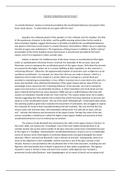Comedy Comparison practice essay 5
‘In comedic literature, humour is primarily provided by the uncultivated behaviour and speech of the
lower social classes.’ To what extent do you agree with this view?
Arguably, the colloquial speech of the speakers in Tam o’Shanter and Mrs Sisyphus, the folly
of the eponymous character in the latter, and the guiltily amusing actions taken by the vandal in
Sunny Prestatyn together suggest that humour is primarily provided by the uncultivated behaviour
and speech of the lower social classes in comedic literature. Nevertheless, Wilde’s focus on exposing
the folly of upper-class individuals in The Importance of Being Earnest in addition to Duffy’s satirical
presentation of the heroic Sisyphus means that humour is not primarily provided by the lower-
classes, even if it is important in other comedic texts.
Indeed, in Earnest, the traditional view of the lower-classes as uncultivated and the higher
orders as sophisticated in Victorian times is inverted; the rationality of the servants, Lane and
Merriman, serves to juxtapose the uncultivated speech of the upper-classes. Only when the servants
are present do the higher orders act in a manner befitting of their reputation, as this ‘exercises a
restraining influence’. Otherwise, the epigrammatical speech of characters such as Algernon can be
considered uncultivated – for example, he claims that ‘divorces are made in heaven’, which is a
dangerous view to take in the context of a society which saw marriage as a sacred ritual and
essential to maintaining social positions. In fact, Wilde’s inversion here is more akin to the claim of a
lower-class bachelor, thus satirising the behaviour of the upper-classes and our view of them as
exceedingly moral. Away from the ‘restraining influence’ of the servants, we revel in seeing the
upper-class characters in uncomfortable situations, as when Gwendolen and Cecily break out into
open contempt during their tea scene argument. Wilde sets up a conflict between the town and
country as Gwendolen inwardly insults her rival in the line ‘The country always bores me to death’,
thereby suggesting that they abandon the restraint they would have been expected to exercise and
speak in a most uncultivated manner. The use of the aside ‘detestable girl!’ would particularly amuse
the watching audience given that it indicates the discomfort of Gwendolen, who struggles to repress
her contempt for Cecily in their misunderstanding of Ernest’s identity. The very fact that the two
women unite only moments later, with Gwendolen asking Cecily ‘You will call me sister, will you
not?’, ridicules the falseness and inconstancy of the upper classes. Perhaps the union of the two
women resembles a melodrama in which the higher orders appear shallow and excessive in their
uncultivated behaviour (such as embracing one another).
The actions of Lady Bracknell also characterise the satire of the upper-classes in Earnest. As
the comic villain, her famous line ‘A handbag?’ (one of the most widely interpreted lines in all
comedic drama) sets up the central conflict of the play: that Jack cannot marry Gwendolen because
of his origins in a ‘handbag’. Lady Bracknell’s uncultivated behaviour comes to act as a considerable
source of humour as her interrogative is extremely illogical when compared alongside her earlier
utterance ‘When I married Lord Bracknell, I had no fortune of any kind’. Subsequently, there is no
sense to her objection to Jack’s suitability, and the inversion is one of the play’s primary comic
threads. Humour is also provided by the uncultivated folly of the male characters, including Jack and
Algernon, who lead double lives of deceit in ignorance of their duties as gentleman. The ingenue
character’s name is ‘Ernest in town and Jack in the country’ while Algernon has ‘invented a
permanent invalid called Bunbury’; both doppelgangers act as means of deceit and escaping social





